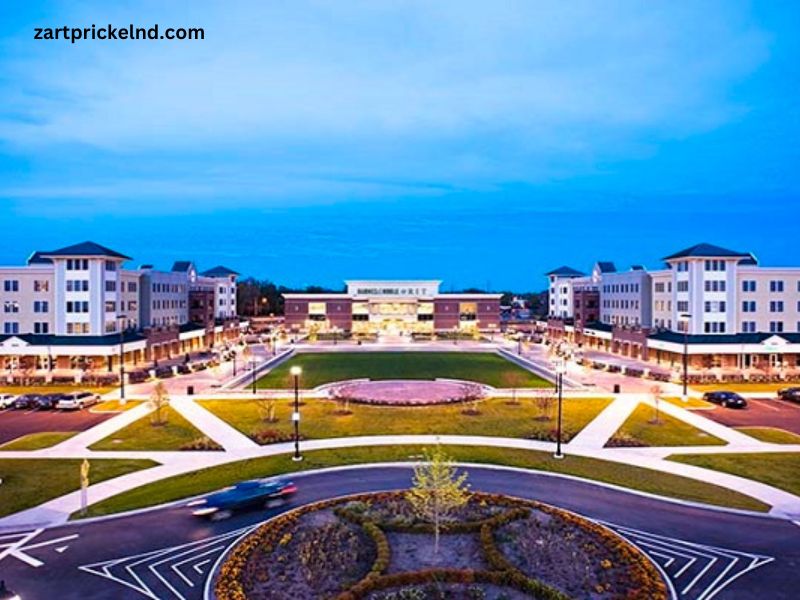The Rochester Institute of Technology (RIT) is a prominent private institution renowned for its strong emphasis on career-oriented education, cutting-edge research, and commitment to diversity and inclusion. Founded in 1829, RIT has grown from a small technical school into a major player in the world of higher education, offering a wide array of programs across various disciplines. This article provides an in-depth look at RIT’s history, academic offerings, campus life, and contributions to research and society.
History and Evolution
RIT was established as the Rochester Athenaeum in 1829 by the Rochester Young Men’s Association. Originally focusing on the liberal arts, the institution evolved to meet the demands of a rapidly industrializing society. In 1885, the school merged with the Rochester Mechanical Institute, and by 1944, it adopted the name Rochester Institute of Technology. This merger marked the beginning of RIT’s transformation into a leading technical and professional education institution.
Over the years, RIT has expanded its footprint both in terms of physical campus and academic offerings. The main campus is situated in Rochester, New York, but the institute also has international campuses in Croatia, Dubai, Kosovo, and the United Arab Emirates, reflecting its global outlook and commitment to providing a diverse educational experience.
Academic Programs and Structure
RIT offers a broad spectrum of academic programs through its nine colleges and schools:
- College of Engineering: Known for its rigorous programs and strong industry connections, this college offers degrees in disciplines such as mechanical engineering, electrical engineering, and industrial engineering. The college emphasizes hands-on learning and has numerous partnerships with leading companies for co-op and internship opportunities.
- College of Applied Science and Technology: This college provides practical and career-oriented programs in fields like computer science, cybersecurity, and applied artificial intelligence. Its focus is on preparing students for immediate entry into the workforce with relevant skills and experiences.
- College of Business: Offering programs in business administration, finance, marketing, and entrepreneurship, this college prepares students for leadership roles in various industries. It emphasizes experiential learning through internships, co-ops, and real-world projects.
- College of Science: This college covers a range of scientific disciplines, including chemistry, physics, and biology. It is known for its research opportunities and state-of-the-art laboratories that support both undergraduate and graduate research.
- College of Art and Design: RIT is renowned for its programs in art and design, including photography, film, and graphic design. The college fosters creativity and innovation, and its students often participate in national and international exhibitions.
- College of Engineering Technology: This college offers programs in applied technologies and engineering technology, focusing on practical skills and industry readiness. It provides a hands-on approach to learning and emphasizes real-world applications.
- College of Health Sciences and Technology: With programs in medical illustration, diagnostic medical sonography, and health information management, this college bridges the gap between healthcare and technology.
- Golisano College of Computing and Information Sciences: Named after entrepreneur Tom Golisano, this college offers cutting-edge programs in computing, data science, and artificial intelligence. It is known for its research in emerging technologies and its strong ties with the tech industry.
- School of International and Global Studies: This school offers programs focused on global issues, international relations, and languages. It prepares students for careers in diplomacy, international business, and global development.
RIT’s commitment to interdisciplinary education is evident in its numerous joint programs and collaborative opportunities across these colleges, allowing students to tailor their education to their career goals and interests.
Campus Life and Student Experience
RIT’s campus life is vibrant and diverse, offering students numerous opportunities for personal growth and development outside the classroom. The university boasts a wide range of student organizations, including academic clubs, professional societies, cultural groups, and recreational sports teams.
Student Organizations: With over 300 student organizations, RIT provides ample opportunities for students to get involved and make an impact. These organizations cover a variety of interests, from academic and professional development to social and cultural activities. Notable groups include the RIT Student Government, the Society of Women Engineers, and the RIT Pep Band.
Greek Life: Fraternities and sororities play a significant role in campus life, providing students with a sense of community and opportunities for leadership and service. RIT’s Greek community is active and involved, contributing to various philanthropic efforts and campus events.
Housing and Dining: RIT offers a range of housing options, from traditional residence halls to apartment-style living. On-campus dining facilities provide diverse meal options, catering to various dietary preferences and needs. The campus is home to several dining venues, including restaurants, cafes, and food courts.
Recreational and Cultural Activities: The university supports a wide range of recreational activities, including fitness centers, sports facilities, and outdoor recreational areas. The RIT College of Art and Design and other departments frequently host art exhibitions, performances, and lectures that contribute to a rich cultural environment.
Support Services: RIT is committed to supporting students through various services, including academic advising, career counseling, mental health services, and disability support. The university provides resources to help students succeed academically and personally.
Research and Innovation
RIT is a leader in research and innovation, with a strong focus on applied research and collaboration with industry partners. The university’s research initiatives span various fields, including engineering, computing, health sciences, and art.
Research Centers and Institutes: RIT is home to several research centers and institutes that drive innovation and address real-world challenges. These include the Center for Advancing STEM Teaching, Learning, and Evaluation, the Institute for Data Science, and the National Technical Institute for the Deaf (NTID), which focuses on research related to deaf and hard-of-hearing individuals.
Industry Collaboration: RIT’s strong connections with industry partners provide students with valuable opportunities for internships, co-ops, and research collaborations. The university works closely with companies and organizations to address industry needs and contribute to technological advancements.
Student Research: Undergraduate and graduate students at RIT are encouraged to participate in research projects and gain hands-on experience. Many students have the opportunity to work alongside faculty members on cutting-edge research, contribute to publications, and present their findings at conferences.
Diversity and Inclusion
RIT is committed to fostering a diverse and inclusive community. The university’s efforts to promote diversity are reflected in its admissions policies, support services, and campus culture.
Diversity Initiatives: RIT actively promotes diversity through various programs and initiatives, including the Office of Diversity and Inclusion, which works to enhance the campus climate and support underrepresented groups.
Support for Underrepresented Students: RIT provides resources and support for underrepresented students, including scholarships, mentoring programs, and cultural organizations. The university’s commitment to inclusion is evident in its efforts to create a welcoming environment for students from diverse backgrounds.
Global Perspective: With its international campuses and global partnerships, RIT offers students a broad perspective on global issues and fosters cross-cultural understanding. The university’s global focus enriches the educational experience and prepares students for careers in an increasingly interconnected world.
Conclusion
The Rochester Institute of Technology stands out as a premier institution of higher education, distinguished by its strong focus on career-oriented education, research excellence, and commitment to diversity and inclusion. With a rich history, a wide range of academic programs, and a vibrant campus life, RIT offers students a comprehensive educational experience that prepares them for success in their chosen fields. The university’s emphasis on innovation, industry collaboration, and global perspectives ensures that its graduates are well-equipped to tackle the challenges of the modern world. As RIT continues to evolve and expand its impact, it remains a beacon of excellence in higher education.



